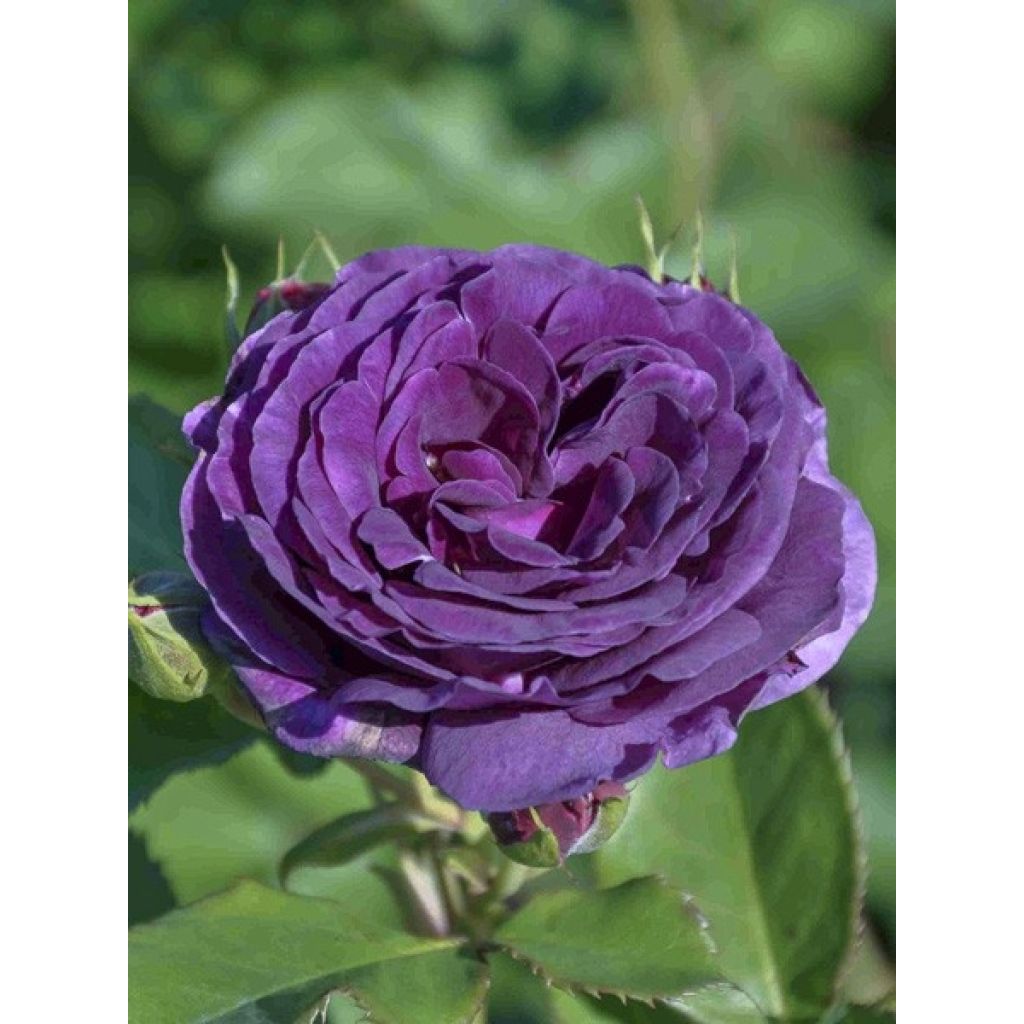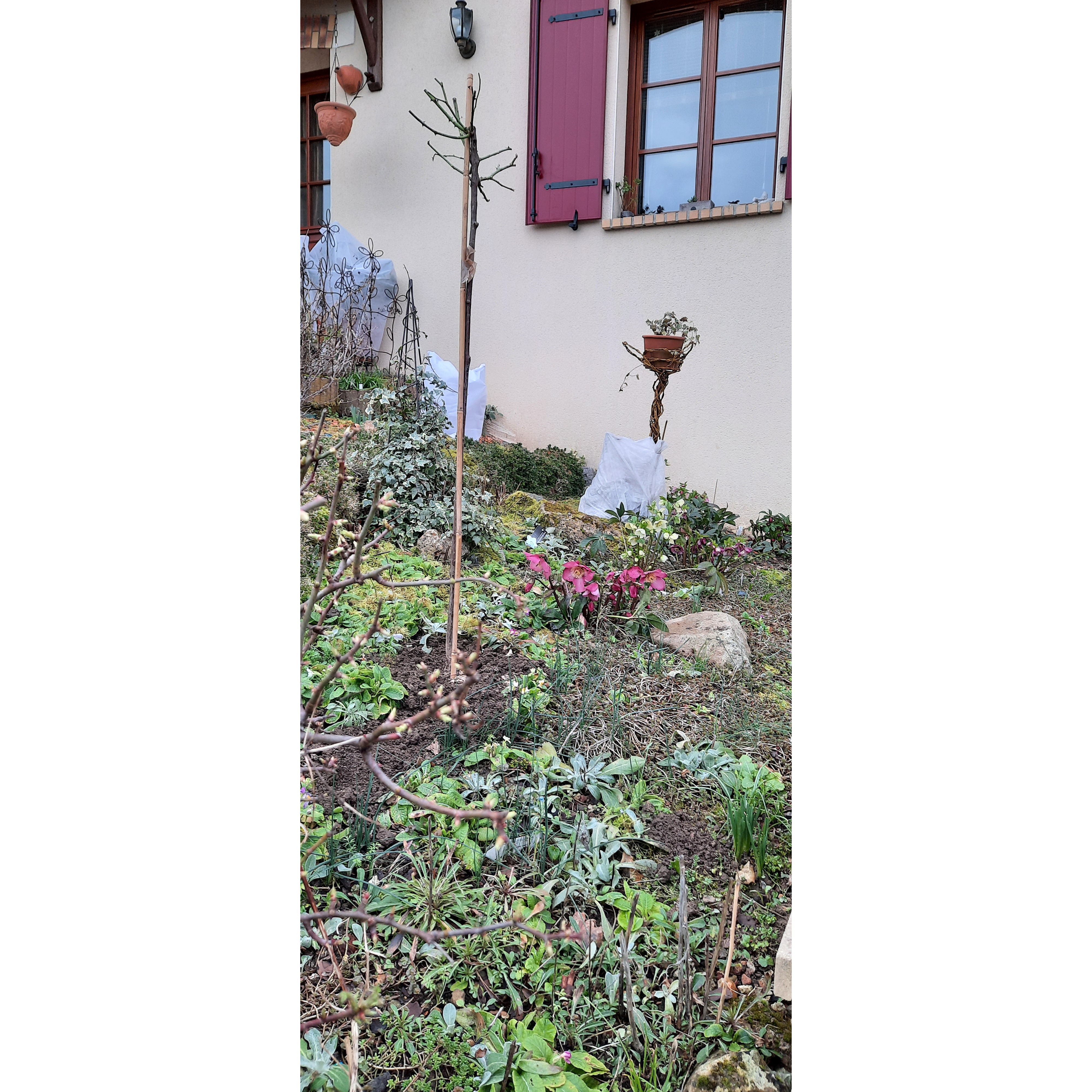

Rosa x floribunda Minerva - Floribunda Rose


Rosa x floribunda Minerva - Floribunda Rose
View more pictures
Hide images

Sandrine C.

Standard rose tree, Minerval, planted at the end of January. In the background, the hellebores purchased from Promesse de Fleurs.
Sandrine C. • 61 FR
Rosa x floribunda Minerva - Floribunda Rose
Rosa x floribunda Minerva 'VISancar'
Floribunda Rose
Rose bush offered to my mother last year, her first purple one. Received in a pot in June and planted right away. Arrived in not-so-great condition, she was afraid it wouldn't make it, but in the end, it bloomed the same year. The flowers, by the way, are a very beautiful shade of purple. I was worried they might lean more towards magenta, but in the end, they have a deep, gorgeous purple color. Placed at the veranda exit, they give off a pleasant fragrance as you walk by. Can't wait for the return of sunny days to admire its beautiful color again. Even I, who am not very into plants, want to plant the same one in my future small garden. I highly recommend it 100%.
Melody A, 23/02/2025
Special offer!
Receive a €20 voucher for any order over €90 (excluding delivery costs, credit notes, and plastic-free options)!
1- Add your favorite plants to your cart.
2- Once you have reached €90, confirm your order (you can even choose the delivery date!).
3- As soon as your order is shipped, you will receive an email containing your voucher code, valid for 3 months (90 days).
Your voucher is unique and can only be used once, for any order with a minimum value of €20, excluding delivery costs.
Can be combined with other current offers, non-divisible and non-refundable.
Home or relay delivery (depending on size and destination)
Schedule delivery date,
and select date in basket
This plant carries a 6 months recovery warranty
More information
We guarantee the quality of our plants for a full growing cycle, and will replace at our expense any plant that fails to recover under normal climatic and planting conditions.

Description
The 'Minerva' Rose is an astonishing Belgian creation for two reasons. Unique for a floribunda, its double roses are remarkably fragrant and, furthermore, have a unique mauve-violet colour that absorbs light in a remarkable way. Developed in 2004, this compact bush rose has only been on the market since 2010. In addition to its extraordinary flowering, it also has good disease resistance. This well-bred variety, awarded for its fragrance in Saverne in 2008 and in Madrid in 2011, is undoubtedly destined for a bright future in our gardens. Its modest size also allows it to be grown on a terrace or balcony, in a carefully chosen large pot.
The cluster-flowered rose 'Minerva' is part of the floribunda roses, obtained through the cross-breeding of polyantha roses and tea roses. These plants are characterised by their long and abundant flowering, in the form of clusters of larger flowers than those of polyanthas. 'Minerva' is the result of the cross-breeding between the varieties 'Sharon's love' and 'Marie-Louise Velge', whose flowers, curiously, are white.
'Minerva' forms a small bush that is on average 75cm (30in) tall and spreads 60cm (24in) wide, thorny, vigorous, and bushy, with beautiful abundant and healthy foliage, of a slightly shiny dark green colour. Its flowering is remarkably long, lasting 5 to 6 months when in bloom. This bush continuously produces its very double, informal corollas, in slightly flattened cups, measuring 7-8cm (3in) in diameter, formed by 26 to 40 thick-petaled flowers with a satin finish. They are gathered in generous terminal clusters. The tightly closed buds open into extremely fragrant roses with a slightly more relaxed appearance. The exact shade of the flowers, from blooming to full bloom, is a deep mauve-violet, with some touches of bright pink to magenta. They reveal a beautiful crown of golden stamens when fully open.
Floribunda roses make beautiful small hedges, planted mixed at the edge of the terrace or in small shrub beds. Combine them with abelias, perovskias, or caryopteris, for example. They are good companions for panicle phlox and tall baby's breath. They can also be planted in groups of 5 as isolated plants in a small garden; surrounded by a border of catmints or carnations, they will form a beautiful mass of flowers throughout the season. Purple or mauve roses also pair well with the pink flowers of foxgloves, lavateras, or diascias, for example. Their combination with pale yellow flowers (Iceland poppies, Digitalis lutea) or soft orange (Agastache rupestris, 'Angel's Choir' Poppies, Dahlias) is more daring, but these complementary shades enhance each other. The modest size and extraordinary flowering of 'Minerva' make it a very interesting variety for growing in large pots.
Creation: Martin Vissers (Belgium) in 2004.
Report an error about the product description
Rosa x floribunda Minerva - Floribunda Rose in pictures


Plant habit
Flowering
Foliage
Botanical data
Rosa
x floribunda
Minerva 'VISancar'
Rosaceae
Floribunda Rose
Cultivar or hybrid
Planting and care
Plant this floribunda rose from November to March, in ordinary, well-loosened and free-draining soil. Roses prefer clayey soils, rather heavy than light. In soil that is too sandy, too compact or too dry in summer, it is preferable to bury compost, decomposed manure or leaf-mould at the bottom of the planting hole. However, this rose dreads waterlogged soils in winter. Place it in a sunny position, at most in partial shade. Roses are greedy plants, a specific rose fertiliser application will be beneficial when the foliage emerges, then regularly during the entire flowering period.
To encourage re-blooming, regularly remove faded flowers. Floribunda rose varieties are more vigorous and floriferous than large-flowered rose varieties. Therefore, the stems should be pruned to about a quarter of their length (4 to 6 buds from the base of the stem) at the end of winter. Always prune above an outward-facing bud, so that the bush thickens and the branches do not become tangled in the centre of the shrub.
Planting period
Intended location
Care
-
, onOrder confirmed
Reply from on Promesse de fleurs
Similar products
Haven't found what you were looking for?
Hardiness is the lowest winter temperature a plant can endure without suffering serious damage or even dying. However, hardiness is affected by location (a sheltered area, such as a patio), protection (winter cover) and soil type (hardiness is improved by well-drained soil).

Photo Sharing Terms & Conditions
In order to encourage gardeners to interact and share their experiences, Promesse de fleurs offers various media enabling content to be uploaded onto its Site - in particular via the ‘Photo sharing’ module.
The User agrees to refrain from:
- Posting any content that is illegal, prejudicial, insulting, racist, inciteful to hatred, revisionist, contrary to public decency, that infringes on privacy or on the privacy rights of third parties, in particular the publicity rights of persons and goods, intellectual property rights, or the right to privacy.
- Submitting content on behalf of a third party;
- Impersonate the identity of a third party and/or publish any personal information about a third party;
In general, the User undertakes to refrain from any unethical behaviour.
All Content (in particular text, comments, files, images, photos, videos, creative works, etc.), which may be subject to property or intellectual property rights, image or other private rights, shall remain the property of the User, subject to the limited rights granted by the terms of the licence granted by Promesse de fleurs as stated below. Users are at liberty to publish or not to publish such Content on the Site, notably via the ‘Photo Sharing’ facility, and accept that this Content shall be made public and freely accessible, notably on the Internet.
Users further acknowledge, undertake to have ,and guarantee that they hold all necessary rights and permissions to publish such material on the Site, in particular with regard to the legislation in force pertaining to any privacy, property, intellectual property, image, or contractual rights, or rights of any other nature. By publishing such Content on the Site, Users acknowledge accepting full liability as publishers of the Content within the meaning of the law, and grant Promesse de fleurs, free of charge, an inclusive, worldwide licence for the said Content for the entire duration of its publication, including all reproduction, representation, up/downloading, displaying, performing, transmission, and storage rights.
Users also grant permission for their name to be linked to the Content and accept that this link may not always be made available.
By engaging in posting material, Users consent to their Content becoming automatically accessible on the Internet, in particular on other sites and/or blogs and/or web pages of the Promesse de fleurs site, including in particular social pages and the Promesse de fleurs catalogue.
Users may secure the removal of entrusted content free of charge by issuing a simple request via our contact form.
The flowering period indicated on our website applies to countries and regions located in USDA zone 8 (France, the United Kingdom, Ireland, the Netherlands, etc.)
It will vary according to where you live:
- In zones 9 to 10 (Italy, Spain, Greece, etc.), flowering will occur about 2 to 4 weeks earlier.
- In zones 6 to 7 (Germany, Poland, Slovenia, and lower mountainous regions), flowering will be delayed by 2 to 3 weeks.
- In zone 5 (Central Europe, Scandinavia), blooming will be delayed by 3 to 5 weeks.
In temperate climates, pruning of spring-flowering shrubs (forsythia, spireas, etc.) should be done just after flowering.
Pruning of summer-flowering shrubs (Indian Lilac, Perovskia, etc.) can be done in winter or spring.
In cold regions as well as with frost-sensitive plants, avoid pruning too early when severe frosts may still occur.
The planting period indicated on our website applies to countries and regions located in USDA zone 8 (France, United Kingdom, Ireland, Netherlands).
It will vary according to where you live:
- In Mediterranean zones (Marseille, Madrid, Milan, etc.), autumn and winter are the best planting periods.
- In continental zones (Strasbourg, Munich, Vienna, etc.), delay planting by 2 to 3 weeks in spring and bring it forward by 2 to 4 weeks in autumn.
- In mountainous regions (the Alps, Pyrenees, Carpathians, etc.), it is best to plant in late spring (May-June) or late summer (August-September).
The harvesting period indicated on our website applies to countries and regions in USDA zone 8 (France, England, Ireland, the Netherlands).
In colder areas (Scandinavia, Poland, Austria...) fruit and vegetable harvests are likely to be delayed by 3-4 weeks.
In warmer areas (Italy, Spain, Greece, etc.), harvesting will probably take place earlier, depending on weather conditions.
The sowing periods indicated on our website apply to countries and regions within USDA Zone 8 (France, UK, Ireland, Netherlands).
In colder areas (Scandinavia, Poland, Austria...), delay any outdoor sowing by 3-4 weeks, or sow under glass.
In warmer climes (Italy, Spain, Greece, etc.), bring outdoor sowing forward by a few weeks.





































